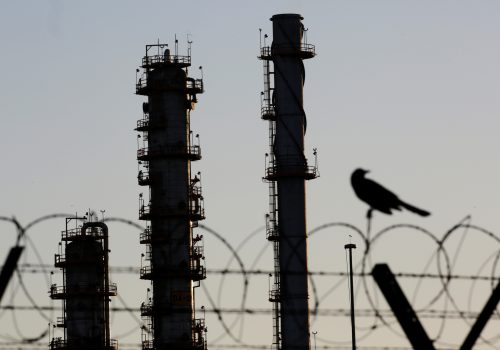In recent years, downstream oil theft—the criminal exploitation of refined petroleum products—has become a lucrative global criminal industry, posing manifold economic, security, environmental, and social threats that must be effectively addressed. Expert panelists Dr. Ian Ralby, Dr. David Soud, and Terzah Tippin Poe discuss the report’s conclusions, including the most effective countermeasures and what countries have seen success in their efforts to combat oil and fuel theft.
Event recap
On Monday, May 18, 2020, the Atlantic Council Global Energy Center hosted a virtual public event to discuss the new report, Downstream oil theft: Countermeasures and good practices. Panelists Dr. Ian Ralby, founder and chief executive officer at IR Consilium, Dr. David Soud, head of research and analysis at IR Consilium, and Terzah Tippin Poe, principal consultant at TRIO Global Solutions, discussed the drivers of downstream oil theft; the threat fuel-related criminal activity poses to economies, communities, and the environment; and appropriate countermeasures to combat these crimes. Ambassador Richard Morningstar, founding chairman of the Atlantic Council Global Energy Center, moderated the conversation.
Dr. Ralby began the discussion with an overview of global downstream oil theft and the current obstacles to effective countermeasure and policy implementation. Downstream oil theft encompasses four criminal modalities—theft, smuggling, adulteration, and fraud—and can apply to criminal groups of all sizes and motivations. While profit motives are usually the strongest incentive for downstream oil theft, those involved in fuel-related crime may also be motivated by the opportunity to win community support. Dr. Ralby asserted that, given the coronavirus impacts on supply chains, distribution networks, and economic stability, the current energy market has created space for criminal organizations to engage in oil theft.
In response to a question about potential countermeasures, Dr. Soud stressed that no “magic bullet” solution exists for downstream oil theft and that a “toolkit” of policies and reforms is necessary to effectively combat fuel-related criminal activity. He affirmed that any successful response must include concrete countermeasures, policy changes, and regional and international collaboration. Tangible actions, such as instituting fuel integrity programs, upgrading fuel meters, monitoring flows, and conducting targeted aerial surveillance, are the “first line of defense,” according to Dr. Soud.
In reducing fuel-related tax evasion and fraud, government initiatives have resulted in measurable gains in public revenue. For example, six months after placing a molecular marker on five different fuels, the Mozambican government witnessed a 32 percent increase in fuel-related tax revenue. Similarly, Tippin Poe affirmed that the petroleum industry has a large role to play in the fight against oil theft, and that it has proactively worked to establish internal regulatory regimes to mandate fuel checking and marking. Furthermore, policy reform can lower economic incentives for downstream oil theft, as subsidies can encourage groups to purchase cheaper oil in one country and smuggle it to neighboring countries to be resold for profit. The cross-border nature of many downstream oil theft activities requires international coordination; mutual legal cooperation, joint investigative teams, and regional security frameworks can all help to combat globalized crime, and in particular, downstream oil theft.
Tippin Poe highlighted the importance of communicating the consequences of downstream oil theft to affected local communities. Criminal organizations sell stolen or adulterated fuel at cheaper prices to gain popular support and grow public trust. In instrumentalizing the “Robin Hood effect,” criminals may portray themselves not as thieves, but rather as public servants, further complicating government efforts to fight downstream oil theft and undermining community support for reform. However, using stolen fuel hurts these communities in the long run, depriving governments of critical tax revenue commonly used to fund infrastructure improvements and social services. Additionally, downstream oil theft can have substantial, negative effects on the environment, as additives in adulterated fuel increase the risk of blown pipelines and generate significant public health consequences that officials “haven’t even been able to calculate yet,” according to Tippin Poe. Effective communication at the local, regional, and transnational level is necessary to build the political will required for policy and regulatory reform.
In pivoting to the role of emerging technologies in combating oil theft, Dr. Soud indicated that innovative solutions like sophisticated molecular fuel marking programs can help mitigate and prevent fuel theft. He also added that artificial intelligence (AI) and blockchain technologies, while valuable, will likely only play a small part in the fight against downstream oil theft. While AI data filtering and analysis can support predictive analytics in preempting criminal activity, especially when combined with maritime domain awareness, blockchain technology has much more limited application in this field; unless paired with physical measures, blockchain tech will not be able to certify that a fuel is unadulterated.
The discussion concluded with each panelist offering, in their perspective, the most effective strategies to prevent stolen fuels from being reintroduced into the supply chain. Tippin Poe asserted that in order to build successful countermeasure programs, governments, oil companies, and local communities must work together. Dr. Ralby commented that higher risks for criminals would deter future theft, and Dr. Soud highlighted that concrete countermeasures are necessary to identify if the fuel being introduced to consumer markets is legitimate.
A conversation with
Terzah Tippin Poe
Principal Consultant
TRIO Global Solutions
Dr. Ian Ralby
Founder and Chief Executive Officer
IR Consilium
Dr. David Soud
Head of Research and Analysis
IR Consilium
Moderated by
Amb. Richard Morningstar
Founding Chairman, Global Energy Center
Atlantic Council
See the full report

The Global Energy Center develops and promotes pragmatic and nonpartisan policy solutions designed to advance global energy security, enhance economic opportunity, and accelerate pathways to net-zero emissions.
